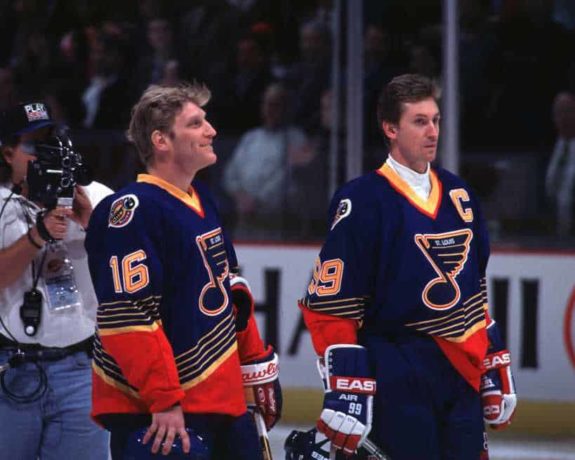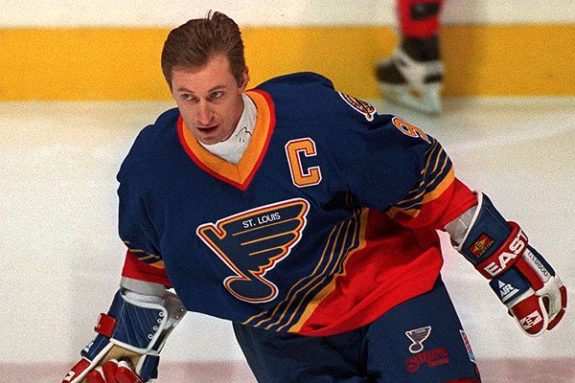The 1995-96 St. Louis Blues were a collection of hockey’s aged superstars. A team with an all-in mentality. One that endeavored to squeeze whatever elixir was still left in the proverbial fountain of youth. But for some reason, it didn’t quite work.
Wayne Gretzky’s time with the Blues is likely the least talked about time of his career. That stems mainly from the fact that his stay in St. Louis did not last very long. Just 18 regular season games with “The Great One” wearing the blue note, plus 13 more in the playoffs. A one and done deal.
What fans and historians of the game need to realize is that this particular juncture in Gretzky’s career holds a lot of hidden gems and interesting tidbits. One could make the argument that every season of Gretzky’s career was important and unique but there is something particular about his time with the 1995-96 Blues that contributed noteworthy moments to “The Great One’s” career. And that is what makes Gretzky’s 1995-96 season one for the ages.
See You in St. Louis, Wayne!
The Blues obtained Gretzky for next to nothing. Certainly not what he was worth. On Feb. 27, 1996, St. Louis shipped forwards Craig Johnson, Roman Vopat, and Patrice Tardif to the Los Angeles Kings to obtain Gretzky. They also included their 5th round pick in the 1996 draft (Peter Hogan) and their 1st round pick in the 1997 draft (Matt Zultek) as part of the deal. Neither Hogan nor Zultek ever played a game in the NHL.
The deal was made in order to give the Blues that final push needed to win the Stanley Cup. Gretzky was the player who would get them over the hump. Or so general manager and head coach “Iron Mike” Keenan believed at the time.

The other obvious reason for the trade was the chance to place the game’s greatest playmaker on a line with one of the grandest pure goal scorers in Brett Hull. This, at least, partially worked. In those 18 regular season games, he and Hull combined for goals on six different occasions. Gretzky helped set up three of Hull’s goals, while Hull set up two of “The Great One’s”. Separately, Gretzky and Hull both combined to assist on a marker from left-winger Stephane Matteau.
Something Was Missing on the Port Side
And that may be one of the reasons why the 1995-96 Blues did not win it all. When Gretzky won four Stanley Cups with the Edmonton Oilers, there was always a wingnut on the left side that accentuated his and Jari Kurri’s prowess as hockey’s most dangerous scoring threat. Lennon and McCartney always needed a George Harrison, so to speak. Jaroslav Pouzar, Esa Tikkanen, even Dave Semenko filled that role as the left-winger for Gretzky and Kurri, and it worked. Tikkanen arguably clicked with the duo the best.

St. Louis had a multitude of left-wingers in 1995-96. In the brief period of time he played with the team, Gretzky and Hull would be paired with all of them interchangeably. Matteau, Geoff Courtnall, Shayne Corson, Yuri Khymlev, and even Tony Twist. The irony being that St. Louis had Tikkanen on their roster in the earlier part of the season but had shipped him to New Jersey in November well before Gretzky was on the team.
Keenan could not settle on a permanent linemate for Gretzky and Hull. Khmylev was picked up at the trade deadline from the Buffalo Sabres. Ultimately, he won the job manning the port side in the final playoff games of Gretzky’s tenure as a St. Louis Blue. Keenan did what he could to get the Blues past the Detroit Red Wings in the second round of the postseason, but it was not meant to be.
The Make up of the Blues Roster
Of the 27 players to appear in at least one postseason game for the 1995-96 Blues, 16 of them were in their thirties, two more were 29. Keenan assembled a blend of former Edmonton Oiler greats and some of his 1994 Cup-winning New York Rangers into a conglomerate of talent on St. Louis.
Gretzky, Glenn Anderson, Grant Fuhr, Geoff Courtnall, Charlie Huddy and Craig MacTavish had all won at least one Stanley Cup with the Oilers during their five championship seasons. Separately, Anderson, MacTavish, Jay Wells, Brian Noonan, Mike Hudson, and Stephane Matteau had all won the Cup alongside Keenan in New York. The talent and the experience were there but not enough to win. Perhaps they were too old. Perhaps the mix of Oilers and Rangers didn’t jive as it had done for “Iron Mike” in 1994.
Keenan certainly gave it his all. Not only did he acquire Gretzky, but Anderson, Matteau, Hudson, MacTavish, and Huddy were all acquired during the season through various trades. Give Keenan full props—he honestly believed it would work.
Gretzky’s Accomplishments With the Blues
While this particular Blues team would not win the Stanley Cup, Gretzky still had some magical moments during his lone hurrah with the team. In 18 regular season games, he scored eight goals and 13 assists for 21 points. Combined with the 81 points he scored with the Kings prior to his trade, 1995-96 would be the final season in Gretzky’s career that he passed the 100-point plateau. In 13 playoff games, he would continue to be a point-per-game player with two goals and 14 assists. Gretzky would also place 15th in the league for Lady Byng Trophy voting.
We take a look at some of “The Great One’s” more meaningful games during this brief stint with the Blues:
Feb. 29, 1996: Gretzky’s very first game with the Blues on Leap Year, no less. In a 2-2 tie with the Vancouver Canucks, he scored his first goal in a Blues uniform. Matteau and Hull picked up the assists.
Mar. 9, 1996: In St. Louis the Blues trounced the visiting Hartford Whalers 6-3. Gretzky would have his only multi-goal game with St. Louis. With Jason Muzzatti in goal for the Whalers, Gretzky scored the Blues’ fifth and sixth goals of the game. The sixth goal was a Gretzky empty-netter. He also had the lone assist on the game-winning tally by Adam Creighton.
Mar. 15, 1996: Gretzky had a three point night in a 4-2 win over the San Jose Sharks. Both of his assists came on power play goals by Hull in the second period. Gretzky would net the game-winner in the third period with assists going to Hull and Corson.
Mar. 28, 1996: The Blues and the New Jersey Devils played to a 4-4 tie. Gretzky had yet another three point night in the process. He opened the scoring with the first goal of the game on an unassisted shorthanded goal. He would then add two assists on goals by Courtnall as the Blues came from behind at 4-2 to knot it at 4-all.
Apr. 3, 1996: In a 6-3 win over the Colorado Avalanche, Gretzky scored his final regular season goal and points for the Blues. He scored a second period power play tally to get his 23rd goal of the year. He and Noonan assisted on Anderson’s third period power play goal with 20 seconds left in the game.
Apr. 16, 1996: Game 1 of the opening round series between the Blues and the Toronto Maple Leafs. Gretzky led the Blues to a 3-1 victory while setting up all three St. Louis goals. He picked up assists on goals by Corson, Hull and Stephen Leach.
Apr. 23, 1996: Gretzky gave arguably his finest playoff performance of his Blues career. Taking Game 4, the Blues won 5-1. Gretzky set up three goals—two by Corson and one by Noonan. On top of that, Gretzky finished the game as a plus-5.
Falling Short but the Memories Are There
While they would defeat the Maple Leafs in six games, the 1995-96 Blues would fall at the hands of the Red Wings in the second round. Once leading the series 3-2, the Blues allowed Detroit to come back and win the series in Game 7. Of course, the series-clinching goal was the now ever-famous double overtime goal by Steve Yzerman which he blasted by Blues goalie Jon Casey.
That was it. The team that was assembled to win it all was soon no more. Anderson, Wells and Huddy were all gone by the time the 1996-97 season came around. Once the season started, Corson, Noonan, Peter Zezel, Christer Olsson, and Murray Baron were traded away. Keenan would be relieved of his duties as both GM and coach in mid-December. This stemmed namely from a very public feud with Hull, the Blues’ marquee player.
Gretzky also found greener pastures and took up residence in Manhattan. In July after their playoff elimination, “The Great One” signed with the New York Rangers. With New York, he would play the final three seasons of the greatest career ever compiled by a hockey player.
Though it may have been fleeting, Gretzky’s 1995-96 season with the St. Louis Blues is and will forevermore be one for the ages.
* originally published in Dec. 2017